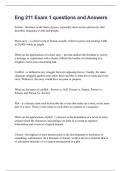Eng 211 Exam 1 questions and Answers
Fiction - literature in the form of prose, especially short stories and novels, that
describes imaginary events and people.
Short story - is a brief work of fiction, usually written in prose and running 1,600
to 20,000 words in length.
What are the applications of a short story - provide authors the freedom to convey
a message or experiment with a theme without the burden of committing to a
lengthier, more time-consuming task.
Conflict - is defined as any struggle between opposing forces. Usually, the main
character struggles against some other force and this is what drives each and every
story. Without it, the story would have no point or purpose.
What are the types of conflcit - Person vs. Self, Person vs. Nature, Person vs.
Person, and Person Vs. Society
Plot - is a literary term used to describe the events that make up a story, or the main
part of a story. These events relate to each other in a pattern or a sequence.
What are the applications of plot? - is known as the foundation of a novel or story,
around which the characters and settings are built. It is meant to organize
information and events in a logical manner.
Climax - the highest or most intense point in the development or resolution of
something; culmination, (in a dramatic or literary work) a decisive moment that is
of maximum intensity or is a major turning point in a plot
,What are the applications of climax - when used as a plot device, helps readers
understand the significance of the previously rising action to the point in the plot
where the conflict reaches its peak and it also helps make readers mentally
prepared for the resolution of the conflict.
In medias res - the practice of beginning an epic or other narrative by plunging into
a crucial situation that is part of a related chain of events; the situation is an
extension of previous events and will be developed in later action.
What are the applications of in media res - means narrating a story from the middle
after supposing that the audiences are aware of past events and demands beginning
a narrative in the very middle of its action from some vital point when most of the
action has occurred.
Narrator - is the person telling the story, and it determines the point of view that the
audience will experience. Every work of fiction has one! and it can take many
forms—it may be a character inside the story (like the protagonist) telling it from
his own point of view.
What are the applications of Narrator? - its most important role is in fiction, where
the style of narration determines everything about how the story is told,
experienced, and understood by readers.
Point of view - is important in a story because it helps the reader understand
characters' feelings and actions. Each character will have his or her own
perspective, so whoever is telling the story will impact the reader's opinion of other
characters and events
What are the applications of point of view - to express the personal emotions of
either themselves or their characters
, Characterization - is used step-by-step in literature to highlight and explain the
details about a character in a story.
What are the applications of characterization? - it helps us make sense of the
behavior of any character in a story by helping us understand their thought
processes and a good use of it is when it always leads the readers or audience to
relate better to the events taking place in the story.
Character types - include protagonists, antagonists, dynamic, static, round, flat, and
stock. They can both fit into more than one category and change from one category
to another throughout the course of a story
Antihero - is a main character in a story who lacks the typical heroic qualities of
bravery, courage, morality, and the special ability and desire to achieve for the
greater good and is thus still the protagonist of the narrative, yet is a foil to the
traditional hero archetype.
What are the applications of antihero in a literature - It can be used to represent
many things at the same time, such as social flaws, human frailties, and political
culture. Also is usually given the most prominent role after the protagonist, and is
represented as an amalgamation of both good and evil
Epiphany - is that moment in the story where a character achieves realization,
awareness, or a feeling of knowledge, after which events are seen through the
prism of this new light in the story.
What are the applications of epiphany? - in a novel or a short story is to point out a
turning point for a character, or in the plot, in the near future. It may also be used to
change the opinion of one character about other characters, events, and places after
a sudden awareness of the situation.




